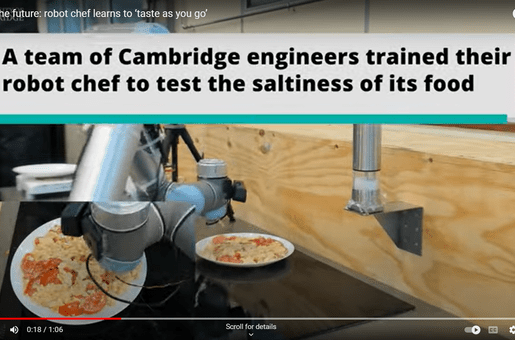COBOT CHEF TRAINED TO “TASTE FOOD AS IT GOES”
“If robots are to be used for certain aspects of food preparation, it’s important that they are able to ‘taste’ what they’re cooking” – Grzegorz Sochacki
Researchers at the University of Cambridge’s Department of Engineering have trained a collaborative robot (or cobot) to taste test food, using the ideology of human chewing to ‘taste as it goes’.
When we chew our food, we notice a change in texture and taste – as we chew, releasing both saliva and digestive enzymes, our perception of flavour will change. This is what the researchers in Cambridge’s Bio-Inspired Robotics Laboratory, run by Professor Fumiya Iida, wanted to replicate with the cobot chef. Studies conducted by the laboratory focus on training robots to carry out the so-called last metre problems which humans find easy, but robots find difficult. Cooking is one of these tasks: earlier tests with their robot ‘chef’ have produced a passable omelette using feedback from human tasters.
“Most home cooks will be familiar with the concept of tasting as you go – checking a dish throughout the cooking process to check whether the balance of flavours is right,” said Grzegorz Sochacki from Cambridge’s Department of Engineering, the paper’s first author. “If robots are to be used for certain aspects of food preparation, it’s important that they are able to ‘taste’ what they’re cooking.”
“When we taste, the process of chewing also provides continuous feedback to our brains,” said co-author Dr Arsen Abdulali, also from the Department of Engineering. “Current methods of electronic testing only take a single snapshot from a homogenised sample, so we wanted to replicate a more realistic process of chewing and tasting in a robotic system, which should result in a tastier end product.”
They had the robot taste nine different variations of a simple dish of scrambled eggs and tomatoes at three different stages of the chewing process, and produced ‘taste maps’ of the different dishes. For the cobot to be able to taste the food, researchers attached a conductance probe, which acts as a salinity sensor, to a robot arm. They prepared scrambled eggs and tomatoes, varying the number of tomatoes and the amount of salt in each dish.
Using the probe, the cobot ‘tasted’ the dishes in a grid-like fashion, returning a reading in just a few seconds. To imitate the change in texture caused by chewing, the team then put the egg mixture in a blender and had the robot test the dish again.
“When a robot is learning how to cook, like any other cook, it needs indications of how well it did,” said Abdulali. “We want the robots to understand the concept of taste, which will make them better cooks. In our experiment, the robot can ‘see’ the difference in the food as it’s chewed, which improves its ability to taste.”
This “taste as you go” method significantly improved the cobot’s ability to quickly and accurately assess the saltiness of the dish over other electronic tasting technologies, which only test a single homogenised sample. The results are reported in the journal Frontiers in Robotics & AI.
Their results showed a significant improvement in the ability of collaborative robots to assess saltiness over other electronic tasting methods, which are often time-consuming and only provide a single reading.
While their technique is a proof of concept, the researchers say that by imitating the human processes of chewing and tasting, robots will eventually be able to produce food that humans will enjoy and could be tweaked according to individual tastes.
In future, the researchers are looking to improve the cobot chef so it can taste different types of food and improve sensing capabilities so it can taste sweet or oily food, for example.
The research was supported in part by Beko plc and the Engineering and Physical Sciences Research Council (EPSRC) Centre of Doctoral Training on Agri-Food Robotics (Agriforwards CDT). EPSRC is part of UK Research and Innovation (UKRI). Fumiya Iida is a Fellow of Corpus Christi College, Cambridge.
“Beko has a vision to bring robots to the home environment which are safe and easy to use,” said Dr Muhammad W. Chughtai, Senior Scientist at Beko plc. “We believe that the development of robotic chefs will play a major role in busy households and assisted living homes in the future. This result is a leap forward in robotic cooking, and by using machine and deep learning algorithms, mastication will help robot chefs adjust taste for different dishes and users.”
Credits to the University of Cambridge. For the original article, please see link below:
https://www.cam.ac.uk/research/news/taste-of-the-future-robot-chef-learns-to-taste-as-you-go




